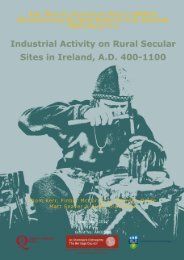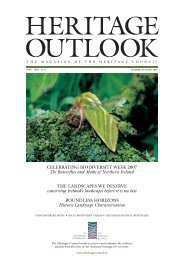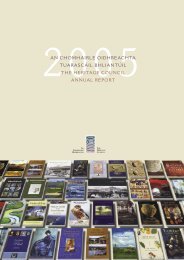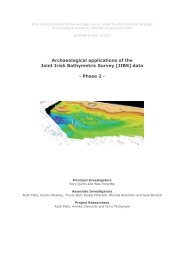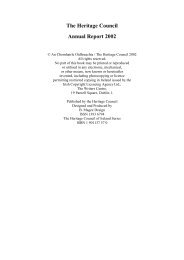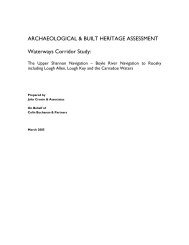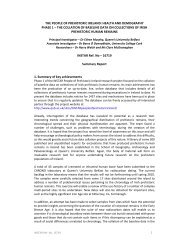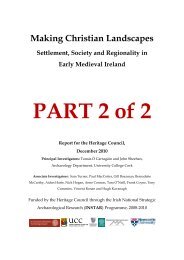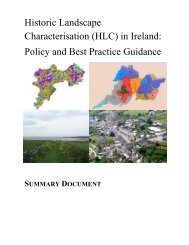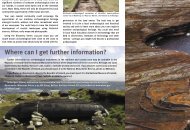- Page 1 and 2:
EARLY MEDIEVAL ARCHAEOLOGY PROJECT
- Page 3 and 4:
Table of Contents TABLE OF CONTENTS
- Page 5 and 6:
Table of Contents Flemington, Co. D
- Page 7 and 8:
Table of Contents Castlefarm, Co. M
- Page 9 and 10:
List of Figures LIST OF FIGURES Fig
- Page 11 and 12:
List of Figures Fig. 91: Plan of en
- Page 13 and 14:
List of Figures Fig. 179: Plan of t
- Page 15 and 16:
List of Figures Fig. 269: Map of Cl
- Page 17 and 18:
Introduction 1. Introduction EMAP i
- Page 19 and 20:
Introduction commonly known by a pa
- Page 21 and 22:
Introduction Acknowledgments We wou
- Page 23 and 24:
County Antrim Fig. 1: Significant e
- Page 25 and 26:
Antrim Fig. 3: Plan of Antiville, C
- Page 27 and 28:
Antrim Armoy (Glebe td.), Co. Antri
- Page 29 and 30:
Antrim southward (e.g. 2004-2005 se
- Page 31 and 32:
Antrim represent a pendant or perso
- Page 33 and 34:
Antrim Fig. 4: Plan of Armoy showin
- Page 35 and 36:
Antrim Ballyaghagan, Co. Antrim Ear
- Page 37 and 38:
Antrim Radiocarbon Dates: (PJ Reime
- Page 39 and 40:
Antrim Fig. 9: Plan of Phase 2 hous
- Page 41 and 42:
Antrim Fig. 10: Plan of Ballymacash
- Page 43 and 44:
Antrim Radiocarbon Dates: (PJ Reime
- Page 45 and 46:
Antrim Fig. 13: Plan of interior of
- Page 47 and 48:
Antrim Fig. 14: Plan of enclosures
- Page 49 and 50:
Antrim Radiocarbon Dates (PJ Reimer
- Page 51 and 52:
Antrim Fig. 16: Plan of Ballyvollen
- Page 53 and 54:
Antrim Ballywee, Co. Antrim Early M
- Page 55 and 56:
Antrim Radiocarbon Dates: (PJ Reime
- Page 57 and 58:
Antrim Fig. 18: Site plan of excava
- Page 59 and 60:
Antrim ‘Craig Hill’ (Craig td.)
- Page 61 and 62:
Antrim Fig. 21: Plan of Craigywarre
- Page 63 and 64:
Antrim The mound was subsequently r
- Page 65 and 66:
Antrim Radiocarbon Dates: (PJ Reime
- Page 67 and 68:
Antrim ‘Doonmore’ (Cross td.),
- Page 69 and 70:
Antrim Fig. 25: Plan of House III a
- Page 71 and 72:
Antrim Fig. 26: Phase I occupation
- Page 73 and 74:
Antrim Dunsilly, Co. Antrim Early M
- Page 75 and 76:
Antrim 53
- Page 77 and 78:
Antrim References: Harper, A. E. T.
- Page 79 and 80:
Antrim ‘Larrybane’ (Knocksoghey
- Page 81 and 82:
Antrim Fig. 33: Plan of excavated a
- Page 83 and 84:
Antrim Fig. 35: Phase 1 roundhouse
- Page 85 and 86:
Antrim Fig. 36: Plan of interior of
- Page 87 and 88:
Antrim Fig. 37: Plan of Seacash, Co
- Page 89 and 90:
Antrim Shane’s Castle Park, Co. A
- Page 91 and 92:
Armagh County Armagh Fig. 39: Signi
- Page 93 and 94:
Armagh Fig. 40: Early Medieval exca
- Page 95 and 96:
Armagh Fig. 42: Excavations at Abbe
- Page 97 and 98:
Armagh Derry More, Co. Armagh Early
- Page 99 and 100:
Armagh Fig. 45: ‘Figure-of-eight
- Page 101 and 102:
Armagh Terryhoogan, Co. Armagh Earl
- Page 103 and 104:
Clare ‘Beal Boru’ (Ballyvally t
- Page 105 and 106:
Clare Fig. 48: Plan of excavated ar
- Page 107 and 108:
Clare The Harvard excavators identi
- Page 109 and 110:
Clare Cahircalla More, Co. Clare Ea
- Page 111 and 112:
Clare Radiocarbon Dates: (PJ Reimer
- Page 113 and 114:
Clare Clonmoney West, Co. Clare Ear
- Page 115 and 116:
Clare were associated with glass fr
- Page 117 and 118:
Clare The main and only major occup
- Page 119 and 120:
Clare Gragan West, Co. Clare Early
- Page 121 and 122:
Clare Inishcealtra, Co. Clare Eccle
- Page 123 and 124: Clare Medieval Activity Significant
- Page 125 and 126: Clare Fig. 54: Excavated areas of I
- Page 127 and 128: Clare Fig. 55: Plan showing enclosu
- Page 129 and 130: Clare Fig. 56: Plan of Thady’s Fo
- Page 131 and 132: Cork Ballyarra, Co. Cork Unenclosed
- Page 133 and 134: Cork Ballycatteen Fort, Co. Cork Ea
- Page 135 and 136: Cork Fig. 59: Plan of Ballycatteen,
- Page 137 and 138: Cork Structure III was a small buil
- Page 139 and 140: Cork to the southern flat area of t
- Page 141 and 142: Cork L-shaped enclosure Beta-165323
- Page 143 and 144: Cork Fig. 61: Plan of St. Gobnet’
- Page 145 and 146: Cork Fig. 62: Plan of enclosure and
- Page 147 and 148: Cork layer of charcoal. The layer o
- Page 149: Cork diagnostic furnace bottoms, or
- Page 152 and 153: Cork Fig. 64: Plan of primary phase
- Page 154 and 155: Cork Fig. 65: Plan of excavations a
- Page 156 and 157: Cork The following is based on gene
- Page 158 and 159: Cork Fig. 67: Plan of Scandinavian
- Page 160 and 161: Cork low-lying marshy location of S
- Page 162 and 163: Cork replaced part of the waterfron
- Page 164 and 165: Cork property boundaries were align
- Page 166 and 167: Cork and smaller plots. Type 4 buil
- Page 168 and 169: Cork The remains of a Type 6 sill-b
- Page 170 and 171: Cork References: Bradley, J., & Hal
- Page 172 and 173: Cork Lennon, A. M. 2003. Grattan St
- Page 176 and 177: Cork Garryduff I & II, Garryduff, C
- Page 178 and 179: Cork Fig. 73: Plan of excavation at
- Page 180 and 181: Cork charred oat grains and one cha
- Page 182 and 183: Cork Lisduggan North 1, 2 & 3, Co.
- Page 184 and 185: Cork Lisleagh II, Co. Cork Early Me
- Page 186 and 187: Cork ‘Lisnacaheragh Fort’ (Garr
- Page 188 and 189: Cork Fig. 77: Plan of Garranes, Co.
- Page 190 and 191: Cork It appears that the three sout
- Page 192 and 193: Cork Oldcourt, Co. Cork Early Medie
- Page 194 and 195: Cork Park North, Midleton, Co. Cork
- Page 196 and 197: Cork Raheens I, Co. Cork Early Medi
- Page 198 and 199: Cork Raheens II, Co. Cork Early Med
- Page 200 and 201: Cork Skahanagh North, Co. Cork Earl
- Page 202 and 203: Donegal County Donegal Fig. 83: Sig
- Page 204 and 205: Donegal Rinnaraw, Co. Donegal Early
- Page 206 and 207: Donegal Fig. 86: Plan of ‘byre-ho
- Page 208 and 209: Down County Down Fig. 88: Significa
- Page 210 and 211: Down Fig. 89: Excavated areas at Ba
- Page 212 and 213: Down Castleskreen Co. Down Early Me
- Page 214 and 215: Down Fig. 93: Aerial photograph of
- Page 216 and 217: Down Radiocarbon Dates: (PJ Reimer,
- Page 218 and 219: Down Radiocarbon Dates: (PJ Reimer,
- Page 220 and 221: Down Fig. 97: Structures in South P
- Page 222 and 223: Down Fig. 98: Plan of Dunnyneill Is
- Page 224 and 225:
Down Gransha, Co. Down Early Mediev
- Page 226 and 227:
Down Lough Faughan Crannog (Ballyro
- Page 228 and 229:
Down Movilla Abbey, Co. Down Early
- Page 230 and 231:
Down Two medieval wells were excava
- Page 232 and 233:
Down Rathmullan Lower, Co. Down Ear
- Page 234 and 235:
Down Fig. 104: Plan of Phase 1 at R
- Page 236 and 237:
Down Tullylish, Co. Down Early Medi
- Page 238 and 239:
Down ‘White Fort’ (Drumaroad td
- Page 240 and 241:
Down Radiocarbon Dates: (PJ Reimer,
- Page 242 and 243:
Dublin Ballycullen, Old Court, Co.
- Page 244 and 245:
Dublin Ballynakelly, Co. Dublin Ear
- Page 246 and 247:
Dublin Areas’ D and E were simila
- Page 248 and 249:
Dublin Barnageeragh, Co. Dublin Ear
- Page 250 and 251:
Dublin Fig. 110: Settlement Enclosu
- Page 252 and 253:
Dublin Cherrywood (Site 18), Co. Du
- Page 254 and 255:
Dublin Fig. 113: Plan of Scandinavi
- Page 256 and 257:
Dublin Also, 55 E ware sherds, from
- Page 258 and 259:
Dublin ‘Dun Emer’, Lusk, Co. Du
- Page 260 and 261:
Dublin Fig. 117: Dun Emer Reconstru
- Page 262 and 263:
Dublin Flemington, Co. Dublin Early
- Page 264 and 265:
Dublin Radiocarbon Dates: (PJ Reime
- Page 266 and 267:
Dublin Fig. 120: Plan of Lusk (Afte
- Page 268 and 269:
Dublin Temple Bar West Grid referen
- Page 270 and 271:
Dublin Fig. 122: Plan of ninth-cent
- Page 272 and 273:
Dublin Fig. 124: Plan of eleventh-c
- Page 274 and 275:
Dublin century, was 2.5m wide and 0
- Page 276 and 277:
Dublin Fig. 126: Plan of ‘road’
- Page 278 and 279:
Dublin Murray’s (1983, 43-57) stu
- Page 280 and 281:
Dublin Fig. 131: Plan of Type 5 Hou
- Page 282 and 283:
Dublin Two structures (‘E’ and
- Page 284 and 285:
Dublin Simpson, L. 1999. Director's
- Page 286 and 287:
Dublin Fig. 132: Aerial photograph
- Page 288 and 289:
Dublin The final phase was associat
- Page 290 and 291:
Dublin Rosepark, Co. Dublin 1. Earl
- Page 292 and 293:
Dublin Fig. 135: Phase II at Rosepa
- Page 294 and 295:
Dublin ‘St Gobban’, Kilgobbin,
- Page 296 and 297:
Dublin St Michael le Pole Ecclesias
- Page 298 and 299:
Dublin and significantly, the archa
- Page 300 and 301:
Dublin accurate, it further points
- Page 302 and 303:
Dublin Radiocarbon Dates: (PJ Reime
- Page 304 and 305:
Fermanagh County Fermanagh Fig. 141
- Page 306 and 307:
Fermanagh and measured approximatel
- Page 308 and 309:
Fermanagh Fig. 142: Schematic Plan
- Page 310 and 311:
Fermanagh Fig. 143: Enclosure at Bo
- Page 312 and 313:
Fermanagh Fig. 144: Excavated area
- Page 314 and 315:
Fermanagh Fig. 146: Plan of Lisdoo,
- Page 316 and 317:
Galway County Galway Fig. 148: Sign
- Page 318 and 319:
Galway Fig. 150: Plan of corner of
- Page 320 and 321:
Galway Fig. 151: Plan of enclosure
- Page 322 and 323:
Galway UB-7433 Adult female 954±31
- Page 324 and 325:
Galway Radiocarbon Dates: (PJ Reime
- Page 326 and 327:
Galway Fig. 153: Plan of early medi
- Page 328 and 329:
Galway Fig. 154: Cells and church a
- Page 330 and 331:
Galway isolated trench immediately
- Page 332 and 333:
Galway from the early medieval peri
- Page 334 and 335:
Galway Loughbown (1), Co. Galway Ea
- Page 336 and 337:
Galway Loughbown (2), Co. Galway Ea
- Page 338 and 339:
Galway Mackney, Co. Galway Early Me
- Page 340 and 341:
Galway Radiocarbon Dates: (PJ Reime
- Page 342 and 343:
Galway Fig. 159: Excavated area at
- Page 344 and 345:
Kerry County Kerry Fig. 160: Signif
- Page 346 and 347:
Kerry Radiocarbon dates support thi
- Page 348 and 349:
Kerry screen) that demarcated the c
- Page 350 and 351:
Kerry Ballyegan, Co. Kerry Early Me
- Page 352 and 353:
Kerry Beginish, Co. Kerry Early Med
- Page 354 and 355:
Kerry Fig. 163: Plan of House 1 at
- Page 356 and 357:
Kerry width) appears to have origin
- Page 358 and 359:
Kerry The fifteenth- to seventeenth
- Page 360 and 361:
Kerry Caherlehillan, Co. Kerry Earl
- Page 362 and 363:
Kerry 1996a, 1999b, 2000). This lat
- Page 364 and 365:
Kerry References Doyle, I. 2009. Me
- Page 366 and 367:
Kerry Church Island (Ballycarbery W
- Page 368 and 369:
Kerry included two hammer-stones, p
- Page 370 and 371:
Kerry Fig. 169: Plan of House 2, Ch
- Page 372 and 373:
Kerry Fig. 170: Plan of Clogher, Co
- Page 374 and 375:
Kerry A number of finds possibly as
- Page 376 and 377:
Kerry Fig. 171: Plan of cave at Clo
- Page 378 and 379:
Kerry Coarhabeg, Valentia Island Ea
- Page 380 and 381:
Kerry Dromthacker, Co. Kerry Early
- Page 382 and 383:
Kerry Radiocarbon Dates: (PJ Reimer
- Page 384 and 385:
Kerry nineteenth century and it is
- Page 386 and 387:
Kerry Fig. 177: Plan of rampart and
- Page 388 and 389:
Kerry Illaunloughan, Co. Kerry Earl
- Page 390 and 391:
Kerry Fig. 179: Plan of the Phase 1
- Page 392 and 393:
Kerry ‘Leacanabuaile’ (Kimego W
- Page 394 and 395:
Kerry Fig. 181: Plan of Leacanabuil
- Page 396 and 397:
Kerry Fig. 182: Aerial photograph o
- Page 398 and 399:
Kerry stones in the southeast and s
- Page 400 and 401:
Kerry surviving to a height of 0.90
- Page 402 and 403:
Kerry Fig. 185: Plan of Structures
- Page 405 and 406:
Kildare Killickaweeny, Co. Kildare
- Page 407 and 408:
Kildare close to Structure 1. It co
- Page 409 and 410:
Kildare ‘Maynooth Castle’ (Mayn
- Page 411 and 412:
Kildare Narraghmore, Co. Kildare Ea
- Page 413 and 414:
Kildare Pollardstown, Co. Kildare E
- Page 415 and 416:
Kilkenny Dunbell Big (5), Co. Kilke
- Page 417 and 418:
Kilkenny Dunbell Big (6), Co. Kilke
- Page 419 and 420:
Kilkenny Reference: Murthagh, B. 19
- Page 421 and 422:
Kilkenny A series of linear feature
- Page 423 and 424:
Kilkenny Loughboy, Co. Kilkenny Ear
- Page 425 and 426:
Laois County Laois Fig. 195: Signif
- Page 427 and 428:
Laois Fig. 196: Features at Parknah
- Page 429 and 430:
Limerick County Limerick Fig. 197:
- Page 431 and 432:
Limerick Fig. 198: Plan of house fo
- Page 433 and 434:
Limerick backfilled deposit. The me
- Page 435 and 436:
Limerick ‘Carraig Aille I’ (Lou
- Page 437 and 438:
Limerick ‘Carraig Aille II’ (Lo
- Page 439 and 440:
Limerick Fig. 202: Plan of Carraig
- Page 441 and 442:
Limerick Finds from these houses an
- Page 443 and 444:
Limerick Fig. 204: Excavated featur
- Page 445 and 446:
Limerick corner of the excavated ar
- Page 447 and 448:
Limerick the ‘enclosure’ is the
- Page 449 and 450:
Limerick was faced with stone. Ther
- Page 451 and 452:
Limerick Grange, Co. Limerick Early
- Page 453 and 454:
Limerick Fig. 207: Excavated areas
- Page 455 and 456:
Limerick no wattle- or postholes an
- Page 457 and 458:
Limerick Newtown, Co. Limerick Earl
- Page 459 and 460:
Limerick Radiocarbon Dates: (PJ Rei
- Page 461 and 462:
Limerick Two burials were uncovered
- Page 463 and 464:
Limerick Sluggary, Co. Limerick Ear
- Page 465 and 466:
Londonderry County Londonderry Fig.
- Page 467 and 468:
Londonderry Fig. 214: Plan of house
- Page 469 and 470:
Londonderry Fig. 215: Early medieva
- Page 471 and 472:
Londonderry Magheramenagh, Co. Lond
- Page 473 and 474:
Londonderry Radiocarbon Dates: (PJ
- Page 475 and 476:
Longford Aghadegnan, Co. Longford E
- Page 477 and 478:
Longford References: Carroll, J. 19
- Page 479 and 480:
Louth Balgatheran 1, Co. Louth Earl
- Page 481 and 482:
Louth Balriggan, Co. Louth Early Me
- Page 483 and 484:
Louth Balriggan was a large multi-p
- Page 485 and 486:
Louth Carn More, Co. Louth Early Me
- Page 487 and 488:
Louth Faughart Lower, Co. Louth Ear
- Page 489 and 490:
Louth 65-82. Dublin. National Roads
- Page 491 and 492:
Louth through the ditch showed that
- Page 493 and 494:
Louth ‘Lissachiggel’, Doolargy,
- Page 495 and 496:
Louth Fig. 224: Detailed plan of ho
- Page 497 and 498:
Louth Archaeological investigations
- Page 499 and 500:
Louth central, L-shaped island of n
- Page 501 and 502:
Louth Fig. 227: Plan of Marshes Upp
- Page 503 and 504:
Louth Millockstown, Co. Louth Early
- Page 505 and 506:
Louth Radiocarbon Dates: (PJ Reimer
- Page 507 and 508:
Louth Fig. 229: Photograph of soute
- Page 509 and 510:
Mayo County Mayo Fig. 230: Signific
- Page 511 and 512:
Mayo Bofeenaun, Co. Mayo Early Medi
- Page 513 and 514:
Mayo Carrowkeel, Co. Mayo Early Med
- Page 515 and 516:
Mayo Radiocarbon Dates: (PJ Reimer,
- Page 517 and 518:
Mayo Fig. 234: Plan of ecclesiastic
- Page 519 and 520:
Mayo Letterkeen, Co. Mayo Early Med
- Page 521 and 522:
Mayo Fig. 237: Features near entran
- Page 523 and 524:
Mayo Fig. 238: Plan of excavated ar
- Page 525 and 526:
Mayo Moyne, Co. Mayo Early Medieval
- Page 527 and 528:
Meath County Meath Fig. 241: Signif
- Page 529 and 530:
Meath Fig. 242: Plan of excavations
- Page 531 and 532:
Meath Fig. 243: Plan of Augherskea,
- Page 533 and 534:
Meath was the burial of a horse’s
- Page 535 and 536:
Meath Radiocarbon Dates: (PJ Reimer
- Page 537 and 538:
Meath Betaghstown (Bettystown), Co.
- Page 539 and 540:
Meath Boolies Little, Co. Meath Ear
- Page 541 and 542:
Meath Castlefarm, Co. Meath Early M
- Page 543 and 544:
Meath Fig. 246: Enclosures at Castl
- Page 545 and 546:
Meath Cloncowan, Co. Meath Early Me
- Page 547 and 548:
Meath Collierstown 1, Co. Meath Ear
- Page 549 and 550:
Meath The Phase III enclosure consi
- Page 551 and 552:
Meath Radiocarbon Dates: (PJ Reimer
- Page 553 and 554:
Meath Fig. 249: Excavations at Colp
- Page 555 and 556:
Meath Fig. 250: Enclosures at Colp
- Page 557 and 558:
Meath Cormeen, Co. Meath Early Medi
- Page 559 and 560:
Meath fragment and frequent flint i
- Page 561 and 562:
Meath Fig. 252: Phases of enclosure
- Page 563 and 564:
Meath Radiocarbon Dates: (PJ Reimer
- Page 565 and 566:
Meath Johnstown 1, Co. Meath Early
- Page 567 and 568:
Meath Radiocarbon Dates: (PJ Reimer
- Page 569 and 570:
Meath Kells, Co. Meath Early Mediev
- Page 571 and 572:
Meath Fifty two burials were reveal
- Page 573 and 574:
Meath Knowth, Co. Meath 1. Early Me
- Page 575 and 576:
Meath Radiocarbon Dates: (PJ Reimer
- Page 577 and 578:
Meath Period II occupation probably
- Page 579 and 580:
Meath References: Comber, M. 1997.
- Page 581 and 582:
Meath Fig. 258: Plan of enclosure a
- Page 583 and 584:
Meath Phase W was occupied c. A.D.
- Page 585 and 586:
Meath populated with good grazing l
- Page 587 and 588:
Meath Nevinstown, Co. Meath Early M
- Page 589 and 590:
Meath graves and were oriented slig
- Page 591 and 592:
Meath Immediately to the west was a
- Page 593 and 594:
Meath Kelly, E. P. 1976:020. Randal
- Page 595 and 596:
Meath miscellaneous scraps of metal
- Page 597 and 598:
Meath Beta-196366 Bone from linear
- Page 599 and 600:
Meath Raystown, Co. Meath Early Med
- Page 601 and 602:
Meath Raystown included evidence of
- Page 603 and 604:
Meath Radiocarbon Dates: (PJ Reimer
- Page 605 and 606:
Meath Roestown 2, Co. Meath Early M
- Page 607 and 608:
Meath Fig. 263: Phases from Roestow
- Page 609 and 610:
Meath St. Anne’s Chapel (Randalst
- Page 611 and 612:
Meath Simonstown, Co. Meath Early M
- Page 613 and 614:
Monaghan County Monaghan Fig. 264:
- Page 615 and 616:
Monaghan north-east of the inner en
- Page 617 and 618:
Offaly ‘Ballinderry II’ (Ballyn
- Page 619 and 620:
Offaly The early medieval crannog a
- Page 621 and 622:
Offaly Ballintemple, Co. Offaly Ear
- Page 623 and 624:
Offaly Clonmacnoise, Co. Offaly Ear
- Page 625 and 626:
Offaly A later roundhouse (7m diame
- Page 627 and 628:
Offaly Fig. 269: Map of Clonmacnois
- Page 629 and 630:
Offaly Manning, C. 1995. Clonmacnoi
- Page 631 and 632:
Roscommon Cloongownagh, Co. Roscomm
- Page 633 and 634:
Roscommon Lennon, A-M. & Henry, M.
- Page 635 and 636:
Roscommon Grid Ref: M78818268 (1788
- Page 637 and 638:
Roscommon Fig. 272: Summary of 2004
- Page 639 and 640:
Sligo ‘Grange West’ (inc. Bally
- Page 641 and 642:
Sligo Sample No. Context 14 C Date
- Page 643 and 644:
Sligo Radiocarbon Dates: (PJ Reimer
- Page 645 and 646:
Sligo Fig. 277: Plan of Promontory
- Page 647 and 648:
Sligo Magheraboy, Co. Sligo Early M
- Page 649 and 650:
Sligo Radiocarbon Dates: (PJ Reimer
- Page 651 and 652:
Sligo Period III, a large mound of
- Page 653 and 654:
Sligo (No plans were available for
- Page 655 and 656:
Sligo Phase 4 was an open stony pla
- Page 657 and 658:
Tipperary Bowling Green, Co. Tipper
- Page 659 and 660:
Tipperary Cormac’s Chapel, St. Pa
- Page 661 and 662:
Tipperary ‘Killederdadrum’ (Lac
- Page 663 and 664:
Tipperary cemetery appears to have
- Page 665 and 666:
Tipperary Fig. 284: Features excava
- Page 667 and 668:
Tipperary Fig. 285: Plan of hut at
- Page 669 and 670:
Tyrone Altanagh, Co. Tyrone Early M
- Page 671 and 672:
Tyrone Clogher (Clogher Demesne td.
- Page 673 and 674:
Tyrone UB-844 Charcoal with iron sm
- Page 675 and 676:
Tyrone Fig. 290: Excavated area at
- Page 677 and 678:
Tyrone Killyliss, Co. Tyrone Early
- Page 679 and 680:
Tyrone Fig. 294: Section through di
- Page 681 and 682:
Tyrone Fig. 295: Excavated features
- Page 683 and 684:
Waterford Ballykilmurry, Co. Waterf
- Page 685 and 686:
Waterford The cave was inhabited so
- Page 687 and 688:
Waterford Radiocarbon Dates: (PJ Re
- Page 689 and 690:
Waterford Radiocarbon Dates: (PJ Re
- Page 691 and 692:
Waterford The final phase of activi
- Page 693 and 694:
Waterford Hiberno-Scandinavian Wate
- Page 695 and 696:
Waterford There are a growing numbe
- Page 697 and 698:
Waterford reinforced by the additio
- Page 699 and 700:
Waterford 1989; Scully 1990). If th
- Page 701 and 702:
Waterford Layers of dumped organic
- Page 703 and 704:
Waterford At least fourteen plots w
- Page 705 and 706:
Waterford Street and High Street is
- Page 707 and 708:
Waterford excavated evidence was co
- Page 709 and 710:
Waterford Structures were uncovered
- Page 711 and 712:
Waterford An excavation at the corn
- Page 713 and 714:
Waterford considerable assemblage o
- Page 715 and 716:
Waterford al.]; editors: Terry Barr
- Page 717 and 718:
Waterford Scully, O. 1992:175. Pete
- Page 719 and 720:
Waterford Woodstown 6, Co. Waterfor
- Page 721 and 722:
Waterford Stratified rotary sharpen
- Page 723 and 724:
Waterford Radiocarbon Dates: (PJ Re
- Page 725 and 726:
Westmeath County Westmeath Fig. 312
- Page 727 and 728:
Westmeath leather, lignite, bone an
- Page 729 and 730:
Westmeath were tilting dramatically
- Page 731 and 732:
Westmeath Fig. 313: Aerial photogra
- Page 733 and 734:
Westmeath structure. Further eviden
- Page 735 and 736:
Westmeath Towards the end of the si
- Page 737 and 738:
Westmeath Fig. 314: Plan of enclosu
- Page 739 and 740:
Westmeath ‘Uisneach’ (Rathnew t
- Page 741 and 742:
Wexford County Wexford Fig. 317: Si
- Page 743 and 744:
Wicklow County Wicklow Fig. 319: Si
- Page 745 and 746:
Wicklow Fig. 320: Plan of sub-recta





